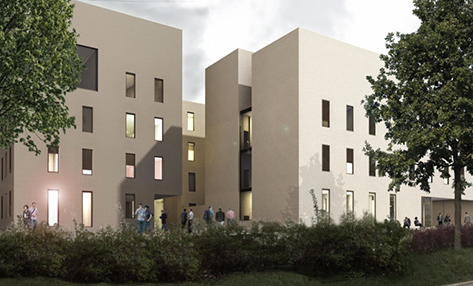For a targeted approach against infections, rapid on-site analysis systems are not only needed in hospitals. Germs must also be detected in food production and livestock. Malaria and tuberculosis pathogens remain a major problem in developing countries. In these areas, the partners of InfectoGnostics, along with the Friedrich Schiller University Jena, the University Hospital Jena and the Ernst Abbe University of Applied Sciences Jena as well as non-university research institutions such as the Institute of Photonic Technology (IPHT), the Leibniz Institute for Natural Products Research and Infection Biology - Hans Knöll Institute (HKI), and leading providers of medical diagnostic and analytical techniques such as Alere Technologies and Analytik Jena are pursuing a long-term research strategy with a clear vision: "We see the research campus as the nucleus for a European centre for infectious diseases, whose core component - in addition to research and development - is training," said the research campus spokesman Prof. Dr. Jürgen Popp, Director of IPHT and the Institute of Physical Chemistry at the University of Jena.
On Friday, 4 October 2014, the founding members will hold a meeting to adopt the Articles of Association. "The association will be the central contact for the needs of research partners," says Dr. Jens Hellwage, Campus Coordinator. “This way, we make sure that we achieve the greatest possible synergies in the research projects." The first projects will start shortly. Issues prioritized on the agenda include the on-site diagnosis of tuberculosis, determination of antibiotics in the blood, detection of pathogens in bodies of water and drinking water, and the identification of biomarkers related to animal diseases. To achieve the fastest possible progress, the work within the research campus is oriented toward the entire innovation chain and value-added chain and combines academic research with industrial research.
The InfectoGnostics research campus is funded by the BMBF and with resources from the Free State of Thuringia. About half of the required budget is financed by the participating partners from research and industry. A total of 111 million is to be invested in the research campus in the next 15 years.
Background of the Federal Government’s “Research Campus” funding initiative
An essential objective of the Federal Government’s high-tech strategy is to promote cooperation between partners from science and industry. The new "Research Campus" funding initiative will encourage medium to long-term cooperations focusing on strategic partnerships in application-oriented basic research. Universities, non-university research institutions and companies will develop the technologies and services of tomorrow and beyond, all in one place, through innovative and future-oriented partnerships.
The Road to a European Centre
